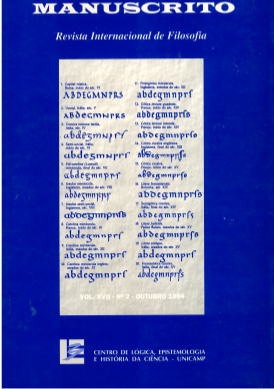Resumo
O objetivo deste artigo é analisar o papel da lógica como uma verdadeira ferramenta para o raciocínio ordinário. Em primeiro lugar, apresentamos uma visão geral das limitações do enfoque chamado “logicista" que usa a lógica como uma linguagem de representação para teorias ordinárias. Depois, chamamos a atenção para uma nítida distinção entre raciocínio teórico e prático, de tal modo que podemos criticar não somente os raciocinadores idealistas, mas também o raciocínio baseado na racionalidade mínima. Finalmente, esboçamos as linhas principais do que deve ser entendido por raciocínio prático.
Referências
Audi, R. (1989), Practical Reasoning. (London, Routledge).
Bratman, M.E. et al (1988), Plans and resource-bounded practical reasoning. In R. Cummins and J. Pollock (eds.), Philosophy and Al. (Cambridge MA, MIT Press).
Bratman, M.E. et al (1985), Davidson's Theory of Intention. In: B. Vermazen y M.B. Hintikka (Eds.), Essays on Davidson: Actions and Events. (New York, Oxford University Press).
Bratman, M.E. et al (1987), Intention, Plans and Practical Reason. (Cambridge MA, Havard University Press).
Bratman, M.E. et al (1988), Intentions and Personal Policies. (Report No. CSLI-88-118, Stanford, CA.).
Bratman, M.E. et al (1991), Practical Reasoning and Acceptance in a Context. (Report No. CSLI-91-158, Stanford, CA.).
Cummins, R. (1991), Meaning and Mental Representation. (Cambridge MA, MIT Press).
Cherniak, C. (1986), Minimal Rationality. (Cambridge, MA, MIT Press).
Cohen, P.R. and Levesque, H.J. (1987), Persistence, Intention, and Commitment. (SRI International. Technical Note 415).
Davidson, D. (1980), Essays on Actions and Events. (New York, Oxford University Press).
Dennett, D.C. (1978), Brainstorms. (Cambridge MA, MIT Press).
Difinetti, B. (1975), Theory of Probability. (New York, Wiley).
Doyle, J. (1988), On Universal Theories of Default. (Carnegie Mellon Computer Science Department, Technical Report CMU-CS-88-111).
Doyle, J. (1988a), Artificial Intelligence and Rational Self-Government. (Carnegie Mellon Computer Science Department, Technical Report CMU-CS-88-124).
Hintikka, J. (1962), Knowledge and Belief: An Introduction to the Logic of the Two Notions. (Ithaca NY, Cornell University Press).
Israel, D. (1985), A Short Companion to the Naive Physics Manifesto. In J. Hobbs & C. Moore (eds.), Formal Theories of the Commonsense World. (Norwood NJ, Ablex Publishing Corporation).
Jeffrey, R. (1983), The Logic of Decision. (Chicago, University of Chicago Press).
Johnson-Laird, P.N. (1988), The Computer and the Mind. (London, Fontana Press).
Kolata, G. (1982), How can Computers get Commonsense. Science 217, 1237-1238.
Konolige, K. (1991), Intention, Commitment and Preference. (Menlo Park CA: SRI International (Manuscrito)).
Levesque, H. (1990), All I Know: A Study in Autoepistemic Logic. Artificial Intelligence 42, 263-310.
Minsky, M. (1975), A Framework for Representing Knowledge. In J. Haugeland (ed.) (1981), Mind Design. (Cambridge MA, MIT Press).
Pequeno, T. & Buchsbaum, A. (1991), The Logic of Epistemic Inconsistency. In J. Allen, R. Fikes, E. Sandewall (eds.), Principles of Knowledge Representation and Reasoning. Proceedings of the Second International Conference. (San Mateo CA, Morgan Kaufmann).
Pollack, E.M. & Ringuette, M. (1990), Introducing the Tileword: Experimentally Evaluating Agent Architectures. In AAAI-90, Proceedings of the Ninth International Conference on Artificial Intelligence. (Boston, MA.).
Pollack, E.M. (1991), Overloading Intentions for Efficient Practical Reasoning. (Report No. CSLI-91-149).
Pollock, J. (1987), Defeasible Reasoning. Cognitive Science 11, 481-518.
Pollock, J. (1989), How to Build a Person. (Cambridge MA, MIT Press).
Pollock, J. (1991), A Theory of Defeasible Reasoning. International Journal of Intelligent Systems 6, 33-54.
Pollock, J. (1992), Cognitive Carpentry: a Blueprint for How to Build a Person (forthcoming).
Savage, J.L. (1972), The Foundations of Statistics. (New York, Dover).
Sheridan, F.K.J. (1991), A Survey of Techniques for Inference Under Uncertainty. Artificial Intelligence 5, 89-119.
Skyrms, B. (1980), Causal Necessity.(New Haven, Yale University Press).
Salmon, N. (1992), On Content. Mind 101, 733-751.
Tversky A. & Kahnerman, D. (1974), Judgement Under Uncertainty: Heuristics and Biases. Science 185, 1124-1131.

Este trabalho está licenciado sob uma licença Creative Commons Attribution 4.0 International License.
Copyright (c) 1994 Manuscrito: Revista Internacional de Filosofia

